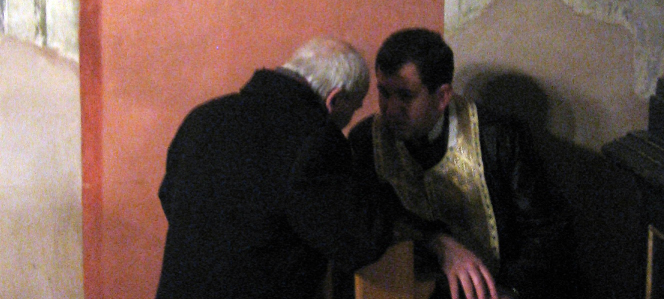“I tell you, on the day of judgment men will render account for every careless word they utter; for by your words you will be justified, and by your words you will be condemned.” – Matthew 12:36-37
My spiritual director once advised me to attend to my use of words in Lent, to reflect at the end of each day how I used my words to either reveal or conceal God, and to pray in the morning asking God to use my words to good effect throughout the day. He cited Pythagoras’ famous saying: “Be silent, or say something better than silence,” and adjured me to observe the same. He gave me four handy scriptural texts for evaluating my speech:
Matthew 5:37: “Let what you say be simply ‘Yes’ or ‘No’; anything more than this comes from evil.”
Ephesians 4:29: “Let no evil talk come out of your mouths, but only such as is good for edifying, as fits the occasion, that it may impart grace to those who hear.”
James 3:1: “Let not many of you become teachers, my brethren, for you know that we who teach shall be judged with greater strictness.”
Luke 12:2-3: “Nothing is covered up that will not be revealed, or hidden that will not be known. Therefore whatever you have said in the dark shall be heard in the light, and what you have whispered in private rooms shall be proclaimed upon the housetops.”
The first quote is reminds me to avoid deceptive dissembling and practice truthful sincerity. The second commands me to use my words to build others up and convey grace. The third warns about my high calling as a teacher who, because I am given such an intimate sharing in the authority of the divine Word (cf Matt. 23:8), will have to give an account for how I used that authority to speak the truth in love. The fourth is about the radically public nature of all words and deeds (cf. Sirach 23:18-19), as on judgment day all I have done or whispered in dark corners will be known to all, to my glory or to my shame.
This last text from Luke has helped me understand the sacrament of Reconciliation in a new way. When I verbalize my most secret sins to another human being (who mystically re-presents Christ), I anticipate the final judgment of the world to come, when all will be known by all. Fr. Hopko, to this effect, says: “Confession is truly a sacrament of the age to come, which is why it demands total, brutal honesty. Get it all out now and expose it to the mercy of God, who will swallow up all your stinking, rotten, perverse words in the furnace of His merciful Word [Psalm 12:6!].” More and more over the years, I have become cognizant that every word I speak echoes on into eternity, and when I stand before the judgment seat of Christ, I imagine each of my words will unite as a song in His presence that is either a hymn of blessing or a dirge of cursing (cf James 3:9-10).
N.T. Wright says that humanity, made in the divine image, is tasked with making present to all creation God’s manner of relating to it. Both animate and inanimate creation should encounter in us God’s oikonomia, the manner in which God cares for this vast cosmic temple He has built. Human beings alone are priests, and have been gifted with the capacity to give voice to God’s Word toward creation in blessing, and to turn creation’s inarticulate voice toward God in grateful praise. I think here of St. Francis of Assisi preaching to the animals and birds, and singing his Canticle of Creation.
So let’s get to it. By your words, at every moment, become the eloquence of God.
